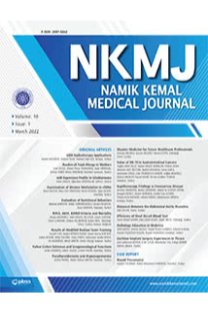Kan Kültürlerinde Üreyen Enterobactericeae İzolatlarında Genişlemiş Spektrumlu Beta-Laktamaz Sıklığı ve Karbapenemaz Varlığının Araştırılması
Kan kültürü, GSBL, karbapenemaz, E.coli
Investigation of Extended-Spectrum Beta-Lactamase Production Frequency and Carbapenemase Activity of Enterobactericeae Strains Isolated from Blood Cultures
Blood culture, ESBL, carbapenemase, E.coli,
___
- 1. Swaminathan M, Sharma S, Poliansky Blash S, et al. Prevalence and risk factors for acquisition of carbapenem resistant Enterobacteriaceae in the setting of endemicity. Infect Control Hosp Epidemiol. 2013;34(8):809-8.2. Çakar A, Akyön Y, Gür D ve ark. Türkiye’de 2014 yılı İçinde izole edilen karbapeneme dirençli Escherichia coli ve Klebsiella pneumoniae izolatlarında karbapenemaz varlığının araştırılması. Mikrobiyol Bul. 2016;50(1):21-33.3. Canton R, Akova M, Carmeli Y, et al. Rapid evolution and spread of carbapenemases among Enterobacteriaceae in Europe. Clin Microbiol Infect. 2012; 18(5): 413-31.4. Clinical and Laboratory Standards Institute (CLSI).Performance Standarts for Antimicrobial Susceptibility Testing; Twenty-fifth Informational Supplement. M100-S25.Wayne PA: CLSI 2015.5. The European Committee on Antimicrobial Susceptibility Testing. EUCAST guidelines for detection of resistance mechanisms and specific resistances of clinical and/or epidemiological importance Version 2.0 2017. (http://www.eucast.org).6. Centers for Disease Control and Prevention. Multiplex real-time PCR detection of Klebsiella pneumoniae carbapenemase (KPC) and New Delhi metallo-β-lactamase (NDM-1). 2011 [https://www.cdc.gov/hai/pdfs/labsettings/kpc-ndm-protocol-2011.pdf]. (Erişim tarihi: 25.07.2017)7. Hindiyeh M, Smollen G, Grossman Z, Ram D, Davidson Y, Mileguir F, Vax M, David DB, Tal I, Rahav G, Shamiss A, Mendelson E, Keller N. Rapid Detection of blaKPC carbapenemase genes by real-time PCR. Journal of Clinical Microbiology 2008 (Sept);2879-2883.8. Weldhagen GF, Prinsloo A. Molecular detection of GES-2 extended spectrum Betalactamase producing Pseudomonas aeruginosa in Pretoria, South Africa. Int J Antimicrob Agents. 2004; 24:35-38.9. Avlami A, Bekris S, Ganteris G, et al. Detection of metallo-β-lactamase genes in clinical specimens by a commercial multiplex PCR system. Journal of Microbiological Methods 2010; 83(2): 185-187.10. Saenz Y, Brinas L, Domínguez E, et al. Mechanisms of resistance in multiple-antibiotic-resistant Escherichia coli strains of human, animal, and food origins. Antimicrob Agents Chemother 2004; 48 (10): 3996-4001.11. Hofko M, Mischnik A, Kaase M, Zimmermann S, Dalpke AH. Detection of carbapenemases by real-time PCR and melt curve analysis on the BD Max System. J Clin Microbiol. 2014; 52(5): 1701-1704.12. Turton JF, Woodford N, Glover J, Yarde S, Kaufmann ME, Pitt TL. Identification of Acinetobacter baumannii by detection of the blaOXA-51-like carbapenemase gene intrinsic to this species. Journal of Clinical Microbiology 2006; 44(8):2974-2976.13. Poirela L, Walshb TR, Cuvilliera V, Nordmanna P. Multiplex PCR for detection of acquired carbapenemase genes. Diagnostic Microbiology and Infectious Disease 2011;70: 119-123.14. Hong SS, Kim K, Huh JH, Jung B, Kang MS, Hong SG. Multiplex PCR for rapid detection of genes encoding class a carbapenemases. Ann Lab Med. 2012;32:359-361.15. Gür D, Gülay Z, Akan OA, ve ark. Türkiye'de hastane izolatı gram-negatif bakterilerde yeni beta-laktam antibiyotiklere direnç ve GSBL tipleri: Çok merkezli Hitit sürveyansının sonuçları. Mikrobiyol Bul. 2008; 42(4):537-44.16. Gür D, Haşçelik G, Aydın N, et al. Antimicrobial resistance in gram-negative hospital isolates: results of theTurkish HITIT-2 surveillance study of 2007. Journal Chemother 2009;21(4):383-389. 17. Pfaller MA, Jones RN. MYSTIC (Meropenem Yearly Susceptibility Test Information Collection) results from the Americas: resistance implications in the treatment of serious infections. MYSTIC Study Group (Americas). J Antimicrob Chemother. 2000; 46(Suppl T2):25-37.18. Poirel L, Heritier C, Tolun V, Nordmann P. Emergence of oxacillinase-mediated resistance to imipenem in Klebsiella pneumoniae. Antimicrob Agents Chemother. 2004; 48(1): 15-22.19. Potron A, Poirel L, Rondinaud E, Nordmann P. Intercontinental spread of OXA-48 beta-lactamase-producing Enterobacteriaceae over a 11-year period, 2001 to 2011. Euro Surveill. 2013; 18(31). pii: 20549.19. Güzel Tunçcan Ö, Tozlu Keten D, Dizbay M, Hızel K. Hastane kaynaklı Escherichia coli ve Klebsiella suşlarının ertapenem ve diğer antibiyotiklere duyarlılığı. ANKEM Derg. 2008;22(4):188-92. 20. Görgeç S, Kuzucu Ç, Yetkin F, Ersoy Y. Kan kültürlerinden izole edilen genişlemiş spektrumlu beta laktamaz üreten gram negatif bakterilerde tigesiklin ve diğer antimikrobiyallerin in vitro etkinliği ve karbapenemaz aktivitesinin araştırılması. İnönü Ünv Tıp Fak Derg. 2011;18(2):106-10. 21. Doyle D, Peirano G, Lascols C, Lloyd T, Church DL, Pitout JD. Laboratory detection of Enterobacteriaceae that produce carbapenemases. J Clin Microbiol. 2012;50:3877-80.22. Bush K. Alarming beta-lactamase-mediated resistance in multidrug-resistant Enterobacteriaceae. Curr Opin Microbiol. 2010; 13(5): 558-564.23. Poirel L, Özdamar M, Ocampo-Sosa AA, Türkoğlu S, Ozer UG, Nordmann P. NDM-1-Producing Klebsiella pneumoniae now in Turkey. Antimicrob Agents Chemother. 2012; 56(5): 2784-2785.24. Kilic A, Baysallar M. The first Klebsiella pneumoniae isolate co-producing OXA-48 and NDM-1 in Turkey. Ann Lab Med. 2015; 35(3):382-383.25. Tekintaş Y, Çilli F, Eraç B, Yaşar M, Aydemir SS, Hoşgör Limoncu M. Klinik Klebsiella pneumoniae izolatlarında karbapenemaz üretiminin saptanmasında polimeraz zincir reaksiyonu ve fenotipik yöntemlerin karşılaştırılması. Mikrobiyol Bul. 2017; 51(3):269-276.26. Lomaestro BM, Tobin EH, Shang W, Gootz T. The spread of Klebsiella pneumoniae carbapenemase–producing K.pneumoniae to upstate New York. Clin Infect Dis. 2006;43(3):268.
- ISSN: 2587-0262
- Yayın Aralığı: 4
- Başlangıç: 2013
- Yayıncı: Galenos Yayınevi
Aynur EREN TOPKAYA, Mine AYDIN KURÇ, Özge TOMBAK, Dumrul GÜLEN
Ayşe KARAOĞULLARINDAN, Osman Kürşat ARIKAN, Sıdıka Deniz YALIM
Plasenta Previa Perkreata Tanı ve Yönetimi: Olgu Sunumu
Cem YENER, Cenk SAYIN, Füsun VAROL
Zeliha Zeynep SATILMIŞOĞLU, İlke ÖZER ASLAN, Nebibe CAN, Gülbahar GÜLCİVAN, Tülin YILDIZ, Mehmetbaki ŞENTÜRK
